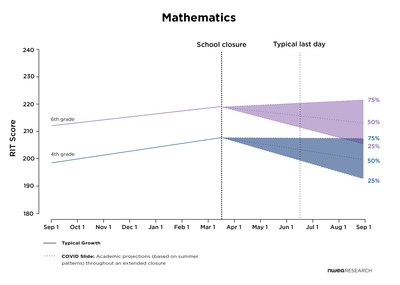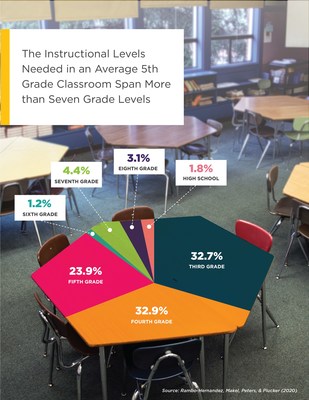Researchers estimate students coming back after COVID-19 closures may have greater variances in academic skills
Researchers estimate students coming back after COVID-19 closures may have greater variances in academic skills
Education community must be prepared to meet a wider range of diverse academic needs of students based on research from NWEA, Texas A & M, John Hopkins University, University of Wisconsin Whitewater and Duke University
PR Newswire
PORTLAND, Ore., May 27, 2020
PORTLAND, Ore., May 27, 2020 /PRNewswire/ -- As COVID-19 educational recovery efforts begin, NWEA, a not-for-profit educational assessment provider, teamed up with researchers from Texas A & M, Johns Hopkins University, University of Wisconsin Whitewater, and Duke University to take a closer look at the practical implications for teachers and students. Two areas were examined: 1) potential impact on pre-existing achievement gaps; and 2) potential impact on typical grade-level skill and knowledge variances.
Each fall, students enter school with a wide range of prior learning experiences and teachers work hard to meet these diverse academic needs. However, COVID-19 related school disruptions are likely to exacerbate these typical variances in learning experiences.
A recent NWEA study projects that learning loss related to COVID-19 closures will not be universal or uniform: students who lack learning opportunities at home or who have already been performing lower than their peers will likely bear the brunt of the COVID-19 related learning losses. On the other hand, students who have support and access to opportunity may learn even more than they would have in school. The combination of these two possibilities is likely to exacerbate inequity that already looms large in schools across the country.
"What we're going to see is that pre-existing achievement gaps are likely to widen further," said Beth Tarasawa, EVP of Research at NWEA. "Closing these gaps will be challenging and it's more important than ever that we come together as a community to support educators."
Peters, Rambo-Hernandez, Makel, Mathews, and Plucker recently reexamined a sample of NWEA's MAP Growth data from ten states to understand the range of instructional levels present in a "typical" fifth-grade classroom at the start of the school year.
"We found an average fifth-grade classroom may include students who have mastered only second-grade content," said Karen Rambo-Hernandez, Associate Professor at Texas A & M. "While others who have mastered eighth-grade content, with instructional needs spanning that broad range."
To make things even more complicated for teachers, on average about 10% of students are English Language Learners, and up to 14% receive special education services with about a third of those students identified as having a specific learning disability. The figure below illustrates the needed instructional levels for all fifth grade students at the beginning of the school year after a typical summer break. If COVID-19 widens student academic needs, then this figure represents the best-case scenario for the task that lies ahead for a fifth-grade teacher in fall 2020. We can only speculate about what fall 2020 will look like. Under the best case scenario the range of instructional levels would remain the same, but the range in fall 2020 may do some combination of widening with the bulk of students still sitting near the middle, possibly only shifting, or even increasing with more students in the extreme instructional levels.
"The enormous challenge facing our education community is immense," said Jacob Bruno, VP of Professional Learning at NWEA. "Teachers will need to look at innovative ways to efficiently and with laser focus determine how to tailor instruction to meet the varying academic and social and emotional needs of each student."
Teachers have finite instructional time, planning time, content expertise, and support for differentiation. As schools look at the task ahead of both recovering lost learning and catching up on growth, they may need to consider:
- Additional learning time (extended hours, weekends, over traditional breaks as an example).
- Using diagnostic data that helps educators analyze where students are at so they can adjust instruction to meet the needs of individual students. Given that most schools will not have end-of-year spring data available as students return to give them a benchmark, getting a "where are they now" check-up on their students is critical so they understand the impact of the COVID-19 disruptions and direct instructional focus appropriately.
- Implementing appropriate goal-setting practices that are reasonable and celebrate the small wins (not just the big ones). The recovery, and not to mention future disruptions from COVID, will be challenging. Goal setting is one way to move forward that addresses both academic and social-emotional needs of students.
- Grouping to challenge a wider range of students while also maintaining diverse, inclusive learning environments that still provides for individualized learning. Grouping students by age or grade level may not be best under the "new normal" of COVID-19 where we see such great variances in knowledge and skills.
View the extended COVID-Slide Learning Loss Research: https://www.nwea.org/research/publication/projecting-the-potential-impacts-of-covid-19-school-closures-on-academic-achievement/
About NWEA
NWEA® is a mission-driven, not-for-profit organization that supports students and educators worldwide by creating assessment solutions that precisely measure growth and proficiency—and provide insights to help tailor instruction. Educators in more than 10,000 schools, districts, and education agencies in 146 countries rely on our flagship interim assessment, MAP® Growth™; our progress monitoring and skills mastery tool, MAP® Skills™; our reading fluency and comprehension assessment, MAP® Reading Fluency™; our personalized learning tool powered by Khan Academy, MAP® Accelerator™; and our new assessment solution that combines growth and proficiency measurement. Visit NWEA.org to find out how NWEA can partner with you to help all kids learn.
![]() View original content to download multimedia:http://www.prnewswire.com/news-releases/researchers-estimate-students-coming-back-after-covid-19-closures-may-have-greater-variances-in-academic-skills-301065739.html
View original content to download multimedia:http://www.prnewswire.com/news-releases/researchers-estimate-students-coming-back-after-covid-19-closures-may-have-greater-variances-in-academic-skills-301065739.html
SOURCE NWEA














